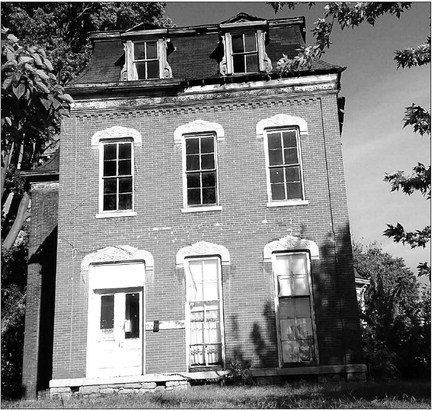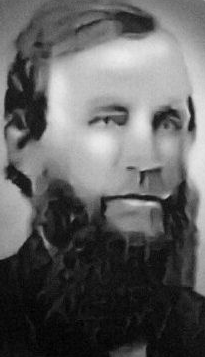Jackson Grimshaw: Power behind Lincoln campaign

Among the many Quincy lawyer-politician friends of Abraham Lincoln was an avid antislavery supporter who took an aggressive role in the Lincoln-for-President campaign in 1860, Jackson Grimshaw.
Grimshaw and Lincoln, both former Whig party members, spoke on behalf of the Republican agenda to an enthusiastic crowd in Springfield on Feb. 1, 1860. This was at a time when Lincoln’s chance at the presidency was only in the minds of devotees but circumstances in its favor were developing. One of the spirited forces behind Lincoln was Jackson Grimshaw.
Born in Philadelphia on Nov. 22, 1820, to William and Harriet Milligan Grimshaw, Jackson Grimshaw, lawyer and politician, was admitted to the bar at Harrisburg, Pennsylvania in 1843. He had studied for a time at Bristol College, undertook the study of law with his father, and for a few years worked as a surveyor and civil engineer.
Grimshaw’s father was a native of Belfast, Ireland, coming to this country and Charleston, S.C., in 1815. He married a Charleston native, Harriet Milligan, who had been given a 1,000-acre plantation, presumably passed on from her family. The couple was so averse to slavery they sold the plantation and moved to the free state of Pennsylvania.

William Grimshaw was a noted writer of many school books including his history of the United States published in 1820. Interestingly Lincoln’s stepsister Matilda Johnston stated that Lincoln as a young man read Grimshaw’s book advocating that immigrants not “turn a blind eye to slavery.” The last paragraph of the book called for action rather than just words in using the phrase “all men are created equal.”
The anti-slavery stance became an integral part of the life of Jackson Grimshaw and would have been a significant tie when the two men became acquainted.
Grimshaw inherited his parents’ regard for liberty best evidenced in his participation in the formation of the Republican Party at the convention in Bloomington on May 29, 1856. It was this convention that brought together Free-Soil Democrats, Whigs, Abolitionists and Knownothings to merge into a new party. Whig party leaders were among those present. Leaders included Richard Yates, Orville Browning, Abraham Lincoln, and Owen Lovejoy. The party platform produced a statement of principles that concisely opposed the extension of slavery into all territory considered free.
Early in February of 1860, seeking to know where Lincoln stood on the possibility of being the nominee for president, Grimshaw urged Lincoln to allow a caucus of close friends and supporters to meet with him. In February a secret session was arranged with a group of Republican leaders. Grimshaw wrote that he asked Lincoln about the “propriety of allowing his name” to be used as a candidate for the presidency.
Others present at the Springfield meeting in the office of O. M. Hatch, Secretary of State, included Hatch, Leonard Swett who was a fellow lawyer, friend and advisor, and Norman B. Judd, chairman of the Republican State committee. Making their preference for Lincoln known, Lincoln responded that he doubted “whether he could get the nomination” but asked if he could think about it until the next morning. Grimshaw asked later if he would accept the vicepresidential nomination and Lincoln responded that his name had been mentioned “rather too prominently for … me to think of accepting the second.” The next day he responded he would be pleased to be the Republican Party candidate. Momentum gathered for Lincoln as Illinois’ favorite son in the following months.
As one of the 12 members of the State Central Committee, Grimshaw worked hard to secure Lincoln’s nomination. On May 12, he was one of the 20plus operatives who gathered in Chicago four days before the scheduled national convention to be held at what was known as the Wigwam. Headquartered at the Tremont Hotel, the team of loyal supporters, primarily attorney friends, worked under the direction of Judge David Davis of the Eighth Circuit. Davis commanded the team working the floor of the Wigwam. Lincoln was inaugurated in March 1861 and shortly thereafter the Civil War ensued.
Grimshaw had many prominent friends including Gov. Richard Yates, to whom he was a trusted counselor. At the beginning of the Civil War in 1861 the governor sent Grimshaw to Washington with dispatches announcing the capture of arms at the St. Louis arsenal in Missouri. Because the railroad had been torn up by southern sympathizers, when Grimshaw got to Annapolis he had to walk 30-plus miles to Washington, D C. Finally completing the long journey, he reported to President Lincoln and Gen. Scott, with his feet protruding from his worn out boots.
President Lincoln rewarded Grimshaw for his loyalty when he appointed him the U. S. Collector of Internal Revenue for the 4th Congressional District where he served from 1865-1869. Grimshaw’s commission was signed by Lincoln two days before he was assassinated on April 14, 1865.
William Herndon, the longtime Springfield law partner of Lincoln, wrote to Lincoln’s friends after the assassination of the president. Soliciting letters in 1866 that would document the president’s life in a book, Jackson Grimshaw received one of Herndon’s letters and replied within a day on April 28, 1866. Grimshaw’s letter has been used by historians as the most reliable source for what occurred at the gathering to gain Lincoln’s commitment to the 1860 presidency.
Recognition of the close relationship between Lincoln and Grimshaw was evident when Lincoln autographed a copy of the Lincoln-Douglas debates with the words, “To the Honorable Jackson Grimshaw, with respects from A. Lincoln.” The copy of this booklet was passed down in a desk that had been the property of prominent law partners Orville Browning and Nehemiah Bushnell and later became the property of Grimshaw. As the desk was generationally passed down the valued signed booklet remained in the desk for many years. Unlike other friends of Lincoln who had resided in Quincy for decades, Grimshaw did not live in Quincy until 1857, just one year before the Lincoln-Douglas Debates. However, he had practiced law in Pike County and lived in Pittsfield for fourteen years. In Pittsfield, a city Lincoln visited often as a circuit lawyer, Grimshaw had practiced law with his older brother, William A., and left to practice in Quincy with the highly regarded Archibald Williams. A Quincy Whig obituary stated that the firm of Williams & Grimshaw argued celebrated cases before the State courts and formed a “bright page in Illinois jurisprudence.” Grimshaw was described as a man of “very rare ability and judgment … none outranked him in eminence at the Bar.”
Known for his honesty, Jackson also got carried away by his impulsive nature at times. Jackson Grimshaw ran unsuccessfully as a Republican candidate in a Democratic district for Congress in 1856 and 1858.
In 1869, Grimshaw resided in his newly built seven-bedroom mansion with mansard roof, summer kitchen and carriage house at the corner of Fifth and Elm, today 804 N. Fifth.
Jackson Grimshaw died on Dec. 13, 1875. Grimshaw, his two wives, and children including three who died at young ages, are buried at Woodland Cemetery.
Iris Nelson is reference librarian and archivist at Quincy Public Library, a civic volunteer, and member of the Lincoln-Douglas Debate Interpretive Center Advisory Board and other historical organizations. She is a local historian and author.






